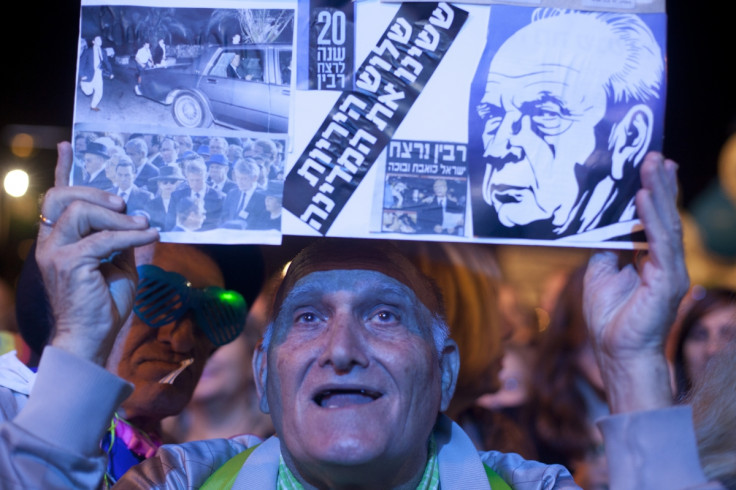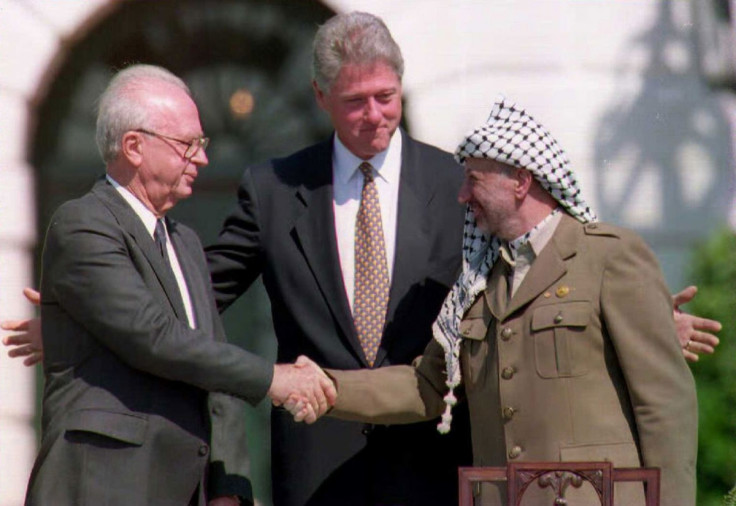Yitzhak Rabin assassination: In the war against Palestine has Jewish terrorism hurt Israel the most?

When Yitzak Rabin was shot dead at a peace rally on 4 November two decades ago it was a right-wing Jewish terrorist, Yigal Amir, who pulled the trigger. Angered by Rabin's signing of the Oslo Accords with Palestinian leader Yasser Arafat, Amir was convinced that Rabin was a traitor for paving the way for a Palestinian state.
It is perhaps useless to speculate on what could have occurred in Israel and Palestine if Rabin had lived. But even 20 years on it is impossible to look at the image of Arafat and Rabin shaking hands before a beaming US President Bill Clinton and not recall Rabin's stirring statement: "Enough of the blood and tears – enough!"
Would Israel and Palestine have descended into the harrowing violence of the Second Intifada from 2001 to 2005? Would an emboldened Hamas have been able to rise to such political heights that it won elections in both the West Bank and Gaza in 2006? Would a generation of leaders such as Ariel Sharon and Benjamin Netanyahu have been able to shift Israeli political consciousness so far to the right, where it remains today?
Two decades since Rabin was shot in the back in the Tel Aviv square that now bears his name, the international and Israeli left would like to think the answer to those questions is no. For them, Rabin, Arafat and Oslo was a moment of great hope and the Israeli leader's death the moment the wheels came off. The last 20 years of walls, wars and violence was started that day by Amir.

It is a simplistic view of history, of course, not least because Amir was not a lone madman with a singularly warped view of the political realities of 1990s Israel. He represented an extreme element in Israeli society that had been seen a year earlier when Baruch Goldstein murdered 29 people at the Ibrahami Mosque in Hebron. Rabin branded Goldstein a degenerate, but his act was – and, in some cases, still is – celebrated by the Israeli far-right.
It is possible to draw a line from Goldstein and Amir to the Jewish extremists that murdered Mohammed Abu Khdeir in 2014 and the perpetrators of the arson attack in Duma in 2015 that killed 18-month-old Ali Sa'ad Dawabsheh, along with his parents. The fanatical, violent element of Israeli society that Amir and Goldstein represented still exists – it may even be stronger than ever.
As well as in the Abu Khdeir and Duma murders, the far-right is reflected in the so-called 'price tag movement', under which groups of extremist settlers that have been branded Hebrew neo-Nazis attack Palestinians and their property in response to what they view as soft government policy towards Arabs. These fanatics consider the entire West Bank and Gaza as Jewish land by God-given right and seek to drive Arabs out.
Many follow the teachings of infamous American rabbi Meir Kahane, who advocated expelling Arabs not only from Israel but from swathes of Jordan, Syria and Iraq up to the river Tigris, which he said was the biblical home of the Jewish people. Kahane founded the US-based Jewish Defence League (JDL) and the now-outlawed Kach political party before being assassinated by an Egyptian gunman in New York.
In August, Kahane's grandson, Meir Ettinger, was arrested for his membership of extremist organisations, with Israeli media reporting he had founded a cell that wanted to carry out a series of attacks against Palestinians that would trigger the end of days. They found a rambling document in his possession that he wanted to spark a powder keg that would once and for all "solve the contradictions between Judaism and democracy".
There has been no suggestion that Ettinger was involved in the Dawabsheh attack, but the ideology that is behind the Kach and Kahanist movement is not uncommon in Israel, particularly in times of war. During the 2014 war in Gaza, peace rallies in Tel Aviv, Haifa and Jerusalem were attacked by far-right gangs that waved Kahanist flags and chanted "Death to Arabs", while calling for Gaza to be "turned into a parking lot".

There has been much speculation as to why the far-right has gained ground in Israel – the same as why Hamas won elections in Gaza and would likely win if free and fair polls were conducted in the West Bank. Two decades after Oslo, Palestinians and Israelis are as divided as ever, with the wall built by Rabin's successor, Ariel Sharon, largely responsible for both geographical and psychological separation between former neighbours.
The violence of the recent "knife intifada" has only gone further to stoke hatred on both sides, with reports of Palestinians being dismissed from their jobs and attacks on Arabs (or, as recently, Ethiopians) suspected of being attackers. Meanwhile, as during the intifada, Israelis have to walk the streets of Jerusalem and Tel Aviv without knowing whether the Palestinian on the other side of the street is concealing a knife and planning an attack.
Given the thousands dead and the rising hatred and rhetoric peddled by both politicians and individuals on either side, perhaps it is redundant to hark back to Rabin two decades after his death. But 20 years on it is tantalising to imagine that things could have been better if he had lived – they could hardly be any worse.
© Copyright IBTimes 2025. All rights reserved.






















